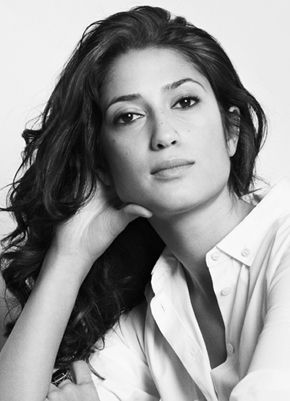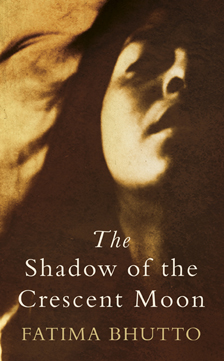Fatima Bhutto borders on empathy
by Mark Reynolds
Author portrait © Paul Wetherell
Fatima Bhutto’s mesmerising and impassioned debut novel The Shadow of the Crescent Moon focuses on the impossible but urgent choices facing five young people living in the tribal areas on the Pakistan border with Afghanistan, where communities are under constant threat from brutal Taliban foot soldiers and American drone strikes – and the vagaries of the Pakistani administration. As the events of a single morning unfold, we observe and inhabit the conflicting minds of three brothers and the two women who mean most to them as they face up to impending horror and devastation. She answers some quickfire questions while on the London leg of her book tour.
Why did you choose fiction to explore the realities of personal freedoms and family and community ties in this region?
“Fiction is important because The Shadow of the Crescent Moon is the story of so many places – not just Pakistan. It could be set anywhere in South Asia, Asia and elsewhere. I think we need stories in these countries, in any areas of turbulence, because looking at violence or conflict simply through the lens of geopolitics is confining. It isn’t enough. We require new perspectives now and many new voices.”
Magnificent nature offers a timeless backdrop to the human failures, frailties and atrocities you depict. How much time did you spend in the north specifically to research this book, its settings and its principal characters?
“My travels in the north began when I returned to Pakistan. I have been travelling around the country since I was young, but I didn’t take any specific trips to the northern frontiers for this book. Some of my earlier travels and memories of the north were borrowed for parts of the book.”
The novel is narrated in a neutral, observational tone, which captures the inevitability of the unfolding drama, and the helplessness of those involved, yet intensifies the horror for the reader. Did you find that a certain level of detachment was a requirement of the story?
“That’s an interesting question – I can’t say I felt detached from any of the characters as I wrote them. The opposite, in fact. Romesh Gunesekera wrote in one of his books that one has to choose whether to observe and classify or imagine and classify – the difference between non-fiction and fiction, I suppose. But I think fiction only works with compassion – once you have that then you can move between observation, which might be detached without empathy, and imagination.”
Samarra is a passionate, principled, fiery and determined woman who is unafraid to make trouble in support of a just cause. How closely do you identify with her above the other characters?
“With all the characters – even when I disagreed with them or found their choices worrying – I felt a strong sense of empathy. I understood Aman Erum’s suffocation, Sikandar’s fear, Hayat’s exhaustion, and certainly Samarra’s anger and passion. But Mina (who is tormented by the loss of her young son) was always the character I loved.”
Which writers do you most admire, and who has influenced your work?
“It’s a constantly evolving list. I just discovered (so late in life) James Baldwin and feel totally transformed by his writing. Damon Galgut’s The Good Doctor was a book that stayed with me a very long time after I read it. Joan Didion’s Salvador. Naipaul’s early work and Agha Shahid Ali’s poetry.”
Which other writers in Pakistan and across the subcontinent should make English-language publishers sit up and take notice?
“There is such extraordinary work coming out of the subcontinent across the arts, it’s always been there but seems to be more noticed outside now. I wish English-language publishers would go back in time a little though – there’s not enough of Habib Jalib’s poetry in English, for example.”
Fatima Bhutto was born in 1982 in Kabul, grew up in Damascus, studied in New York and London and lives in Karachi. She is the daughter of Mir Murtaza Bhutto, a prominent politician who was shot dead by police in 1996 three years after the family’s return to Pakistan from exile, and the granddaughter and niece of executed and assassinated former Pakistan premiers Zulfikar Ali Bhutto and Benazir Bhutto. The Shadow of the Crescent Moon is published in hardback by Viking and as a Penguin eBook. Her previous book, Songs of Blood and Sword: A Daughter’s Memoir, is published by Vintage.
Mark Reynolds is a freelance editor and writer, and a founding editor of Bookanista.


